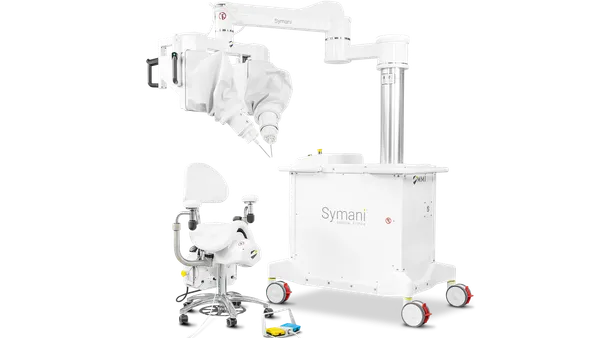Dive Brief:
- Abbott's MitraClip mitral valve repair device proved better at reducing severe secondary mitral regurgitation in heart failure patients than medical therapy alone in three-year results from the COAPT study presented this weekend at the Transcatheter Cardiovascular Therapeutics (TCT) symposium.
- Patients who crossed over to the MitraClip after 24 months benefited as much from the treatment as those who received the device at the beginning of the study, the data also showed.
- Abbott also released cost-effectiveness data on MitraClip reflecting increases in both life expectancy and quality of life for patients who received the device compared with guideline-directed medical therapy. Higher costs were associated with MitraClip compared to guideline-directed medical therapy over two years.
Dive Insight:
Abbott's MitraClip has been approved in the United States to treat primary mitral regurgitation since 2013 and received an expanded indication for secondary regurgitation earlier this year. Whereas primary regurgitation results from the valve's structure, secondary regurgitation may develop in heart failure patients when the left chamber becomes enlarged, preventing the valve's leaflets from closing properly.
Heart failure patients who develop severe secondary mitral regurgitation face high rates of mortality and hospitalization. The traditional treatment for the condition has been guideline-directed medical therapy, which may include cardiac resynchronization therapy (CRT).
MitraClip repairs the valve by clipping together its leaflets to reduce the backflow of blood in a minimally invasive, catheter-based procedure. In Abbott's COAPT study, device-related complications at three years were 8.7%, with 1.4% related to the device and 7.4% related to progressive heart failure. All-cause mortality at three years was 42.8% for MitraClip plus medical therapy, compared to 55.5% for medical therapy alone.
In addition, there were fewer hospitalizations and deaths among patients in the study who crossed over to a MitraClip at two years — with rates comparable to patients originally assigned to the MitraClip — than among those who did not cross over.
"Clearly, the Clip did better than guideline-directed medical therapy," Anthony DeMaria, professor at the University of California San Diego, said in a video presented by the American College of Cardiology.
Abbott said an analysis of the device's cost effectiveness showed use of MitraClip to treat patients with significant secondary mitral regurgitation was projected to increase life expectancy by 1.13 years and quality-adjusted life-years by 0.82 years. Using MitraClip produced an Incremental Cost Effectiveness Ratio of $55,600 per quality-adjusted life year compared with medical therapy. A score below $100,000 is considered cost-effective, implying MitraClip provides a positive health economic value, the company said.
Cost-effectiveness results published in the journal Circulation indicated that, while follow-up costs were significantly lower with the MitraClip, at $26,654 vs. $38,345 for medical therapy, cumulative costs at two years were higher with the device due to upfront procedure costs ($73,416 vs. $38,345).
Registry data also presented at TCT showed procedure success, procedure time and procedural complications improved as surgeons gained experience with MitraClip. The study found the learning curve for the procedure appeared to flatten after about 50 cases but could exceed 200 cases.
Mitral regurgitation is the most prevalent form of valve disease, affecting about one in 10 people over age 75, compared to one in 20 who have aortic valve disease, according to the American Heart Association. CMS is reconsidering a national coverage determination for transcatheter mitral valve repair that could expand the patient population eligible for reimbursement for MitraClip.












